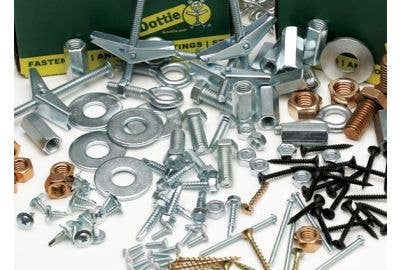Common Fastener Materials


Material Selection: Things to Consider
When selecting a material for fasteners the user
takes into consideration the application, cost,
features, corrosion resistance, strength, and
availability.
There are many materials used to make
fasteners, but the ones specific to Dottie
include: Carbon Steel, Medium Carbon Steel,
18-8 Stainless Steel, 316 Stainless Steel, Solid
Brass, Silicon Bronze, and Nylon.


Carbon Steel & Medium Carbon Steel
Carbon Steel is used for general applications,
or for applications where corrosion resistance is
not a requirement. They are manufactured to
the ASTM A307 Grade A standard and have a
tensile strength of 60,000 PSI.
When higher strength is needed, Grade 5
fasteners may be used. They are made from
heat treated Medium Carbon Steel and are
twice as strong as Low Carbon Steel fasteners.
Carbon steel, as used for fasteners, is classified
as iron with about .08 - .40% carbon and small
amounts of other elements controlled at the maximum. Higher carbon steels can be heat
treated to provide higher strength and
hardness.
Carbon steel is susceptible to rust and
corrosion, therefore they are usually provided
with an electroplated zinc coating. For outdoor
and wet applications, a hot-dipped galvanized
zinc coating is provided.
18-8 Stainless Steel & 316 Stainless Steel
When better corrosion resistance is needed
stainless-steel fasteners are used. Generally,
the stainless-steel alloy is called “18-8”
stainless steel. This means the alloy is similar
to low carbon steel with the addition of
approximately 18% chromium and 8% nickel.
The most common stainless-steel fastener
alloys are 302 and 304.
For better corrosion resistance in environments
such as sea water or marine applications, 316
stainless steel is used. It contains molybdenum
for enhanced corrosion resistance thus
increasing the lifespan of the fastener.
While stainless steel fasteners do not generally
come with a coating, a process called
passivation will prevent any surface
contamination from creating rust spots.
When required, passivation must be requested
by the user
Installation Tips!
• When any lubricant or wax is used with
stainless steel fasteners the torque
value should be lowered to prevent
breaking the fastener on installation.
• 18-8 Stainless-steel fasteners are
considered non-magnetic, but some
may be mildly magnetic.
• Stainless Steel fasteners cost more than
steel fasteners, and 316 stainless-steel
is more expensive than 18-8.
Solid Brass
Composed of two-thirds copper and one third
zinc, brass fasteners are used in marine,
plumbing, electronic and non-magnetic
applications. They are softer than steel and
stainless steel and have good electrical
conductivity and corrosion resistance.
Brass is available in several different alloys;
however, the most common ones are 270, 360,
and Commercial. Brass Alloy 270 contains 65%
copper and 35% zinc and features a tensile
strength of 70,000 PSI and a yield strength of
45,000 PSI. Brass Alloy 360 contains 61.5%
copper, 35.5% zinc, and 3% lead and features
a tensile strength of 50,000 PSI and a yield
strength of 30,000 PSI. Lastly, Commercial
Brass contains 55-65% copper, 35-42% zinc,
and may contain 0.05-3.5% lead.
Silicon Bronze
Silicon Bronze fasteners are typically composed
of 95-98% copper, a small amount of silicon,
and other alloys such as zinc, tin, iron, and
manganese. Silicone bronze fasteners have a
tensile strength of 70,000 PSI. They are the
ideal choice for harsh environments such as
salt water, high heat, power plants, and
corrosive environments and are naturally nonmagnetic. They are a good conductor of
electricity, making them the ideal choice for
grounding and are used for aesthetic and
practical applications.
Interestingly, the color and appearance of these
fasteners may vary on shipment depending on
the level of silicon, zinc and other elements in
the fastener.
Nylon Fastener
Nylon fasteners are a light weight, chemical
resistance fastener used in applications where
harsh chemicals or acids are used. They are
very low strength fasteners and are not suitable
for high temperatures and should not be used
above 185°F.
Most common nuts, bolts and washers are
available in nylon. However, the most popular
nylon fastener is cable ties and wire
managements items. They are not rated for
tensile strength, but typical nylon materials
have a tensile strength of only 10,000 - 12,000
psi.


Share: